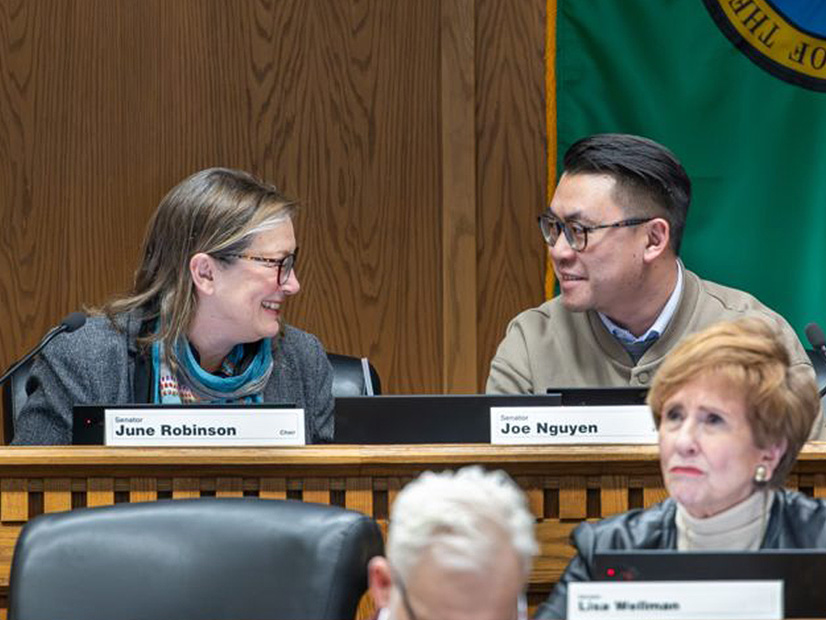Washington legislators are proposing to give the state’s utilities $150 million to be rebated back to residents to help them defray costs associated with the state’s cap-and-invest program.
Washington legislators are proposing to give the state’s utilities $150 million to be rebated back to residents to help them defray costs associated with the state’s cap-and-invest program.
The proposals come after Washington last year grappled with some of the highest gasoline prices in the country, which cap-and-invest opponents attributed to the rollout of the program early last year. (See Cap-and-invest to Loom Large in Wash. Legislative Session.)
Democratic legislative leaders in both chambers unveiled similar $150 million clean energy credit programs Feb. 19 in two supplemental 2023-2025 budget proposals that must be reconciled before the current legislative session ends March 7.
If the funding is approved, the money will go to utilities, which have increased rates partly due to expenses stemming from the cap-and-invest program, then credited back to utility customers.
In the Senate, Ways and Means Committee Chair June Robinson (D) and Sen. Joe Nguyen (D) said lawmakers will have to hash out details related to the size of individual credits and the income thresholds for eligibility to receive them. Robinson speculated the credits would likely be distributed to residents in the fall.
Lawmakers in the House have proposed a one-time $200 credit to eligible households in September.
The credit programs have been proposed ahead of a looming referendum to be held in November on whether to repeal the cap-and-invest program.
In December, Gov. Jay Inslee (D) asked the Legislature to establish a rebate program for lower- and middle-income residents to counteract the higher-than-expected gasoline prices being linked to cap-and-invest. Inslee called for a one-time $200 credit applied to the utility bills of roughly 750,000 low- and moderate-income households. Rep. April Connors (R) introduced a bill similar to the governor’s request, but it never received a committee hearing.
‘Really Suspicious’
At a Feb. 20 press briefing, Washington GOP leaders criticized the timing of the proposed rebate, characterizing it as an election ploy by the Democrats. The Republicans contended the rebate will occur prior to the election with no legislative guarantees of future rebates if voters repeal the cap-and-invest program in November.
“Let’s be candid on how much $200 will help … It’s not much … It’s a little like electioneering,” said Senate Minority Leader John Braun (R).
House Minority Leader Drew Stokesbary (R) echoed that view, saying the timing of rebate “is really suspicious.”
“I wonder how Representative Stokesbary will pay for [the rebates] if we revoke the Climate Commitment Act,” House Majority Leader Joe Fitzgibbon (D) said at a later briefing by Democrats.
Democratic leaders also responded to Republican criticism of Sen. Marko Liias (D), chair of the Senate Transportation Committee, who said repealing the cap-and-invest program will hurt the state’s transportation budget. GOP leaders countered that the transportation budget is independent of the cap-and-invest program.
But Senate Majority Leader Andy Billig (D) noted the cap-and-invest program pays for transportation expenses such as free transit for residents under 18 and some of the conversions of the state’s diesel ferries to hybrid electric vessels, programs the Democrats do not want to revoke.
If the cap-and-invest revenue is eliminated, the limited transportation budget will have to pay for transit and some ferry finances currently supported by the Climate Commitment Act, Billig said.
“We will have to reprioritize everything in transportation,” he said.
Liias noted that cap-and-invest money is paying for roughly one-third of the supplemental transportation budget that the Legislature is currently assembling.
Washington raised about $1.8 billion in its 2023 cap-and invest auctions, money the Legislature is allocating toward clean energy development and programs that mitigate the impacts of climate change, particularly in disadvantaged communities. The Inslee administration is predicting the auctions will raise another $941 million in the first six months of 2024.



